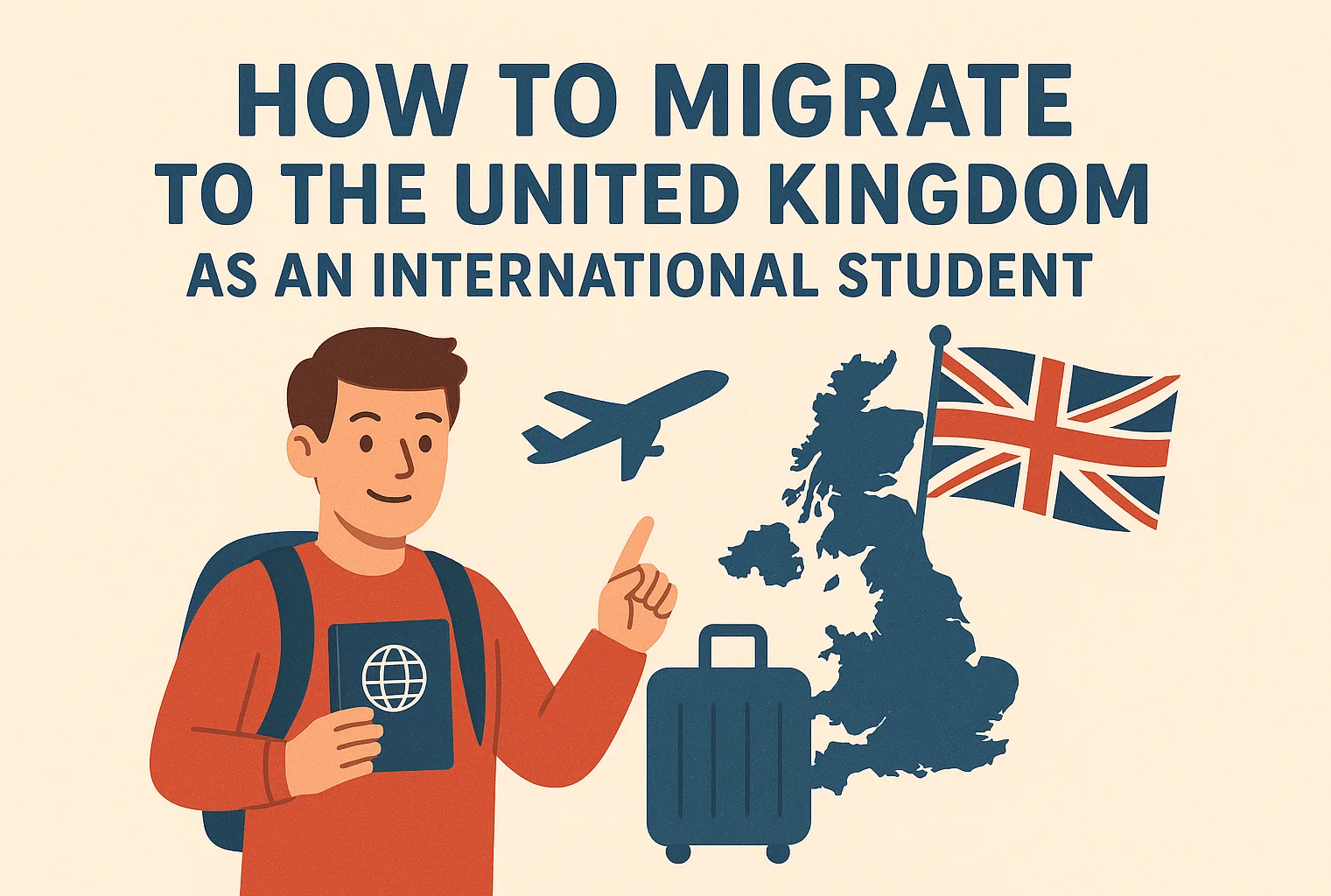Migrating to the United Kingdom as an international student is a dream for many people seeking quality education, career opportunities, and a better standard of living. The UK is one of the most attractive destinations for higher education due to its globally recognised universities, diverse culture, and strong economy.
Every year, thousands of students from Africa, Asia, Europe, and other parts of the world secure visas to study in England, Scotland, Wales, or Northern Ireland, with many of them eventually moving into permanent residency and professional careers after graduation.
Studying in the UK offers more than just academic benefits. It provides a gateway to job opportunities in different sectors such as healthcare, finance, technology, and skilled trades.
Many international students use their study visa not only to gain a degree but also as a strategic pathway to secure work visas and long-term residency. However, this process requires careful planning, a clear understanding of visa regulations, and knowledge of available opportunities for international graduates.
The UK government has policies that make it possible for foreign students to work part-time during studies and full-time during breaks, which allows them to earn an income and gain work experience.
This has made the UK a preferred choice for those who want to combine education with financial stability. From the moment you receive your admission letter to the time you apply for your visa and prepare to relocate, every step must be handled carefully to avoid delays or visa refusals.
In addition to academic opportunities, the United Kingdom is home to some of the highest-paying jobs for qualified professionals. This means that studying in the UK is not just an educational investment; it can also be a stepping stone to a rewarding career.
For example, fields like engineering, IT, healthcare, and finance offer attractive salaries to skilled workers, making it easier for graduates to secure high-paying roles and permanent work visas.
Understanding the migration process as an international student is essential. This involves knowing which documents are required, the right visa category to apply for, and how to transition from a student visa to a work visa after your studies.
By preparing ahead and having a clear plan, you can turn your educational journey into a long-term opportunity for career growth and settlement in the UK.
Ways to Migrate to the United Kingdom
There are several ways to migrate to the United Kingdom, but as an international student, your most direct route is through a student visa. The UK Student Visa, previously known as the Tier 4 (General) Student Visa, is designed for those who have been offered a place at a licensed UK institution.
To qualify, you must meet specific requirements, such as proof of acceptance into a recognised course, evidence of sufficient funds to support yourself, and proficiency in the English language.
Once in the UK, students have different pathways to remain in the country after their studies. One of the most popular is the Graduate Route Visa, which allows eligible students to stay and work in the UK for up to two years after completing their degree (three years for doctoral graduates).
This gives you the opportunity to gain UK work experience, find a permanent job, and apply for a Skilled Worker Visa if your employer is a licensed sponsor.
Another way to migrate is by applying for work visas directly after receiving a job offer from a UK employer. Sectors facing labour shortages, such as healthcare, social care, engineering, and construction, offer visa sponsorship for qualified foreign workers.
If you already have the skills or qualifications in these areas, you could move to the UK without necessarily studying there first.
Family migration is also a possible route. If you have a close relative who is a British citizen or has settled status, they may be able to sponsor your visa. This applies to spouses, children, and dependent family members. While this option is not as common for students, it can be an alternative pathway for those with family ties in the UK.
Some people also migrate through investment or business visas, though these routes usually require a significant financial commitment. For example, the UK Innovator Founder Visa allows entrepreneurs with innovative business ideas to set up in the UK, provided they meet strict requirements.
The key to choosing the best migration route is to assess your personal situation, financial capacity, and long-term goals. For many, starting with a student visa is the most practical step, as it allows you to study, work part-time, and gradually transition into a more permanent immigration status.
What is the Quickest Way to Migrate to the United Kingdom?
The quickest way to migrate to the United Kingdom largely depends on your circumstances, qualifications, and financial readiness. For most international students, the fastest route is to secure an admission offer from a recognised UK university or college and apply for a student visa.
Unlike many other visa categories, the student visa process can be completed in a few weeks once all requirements are met, provided your documents are accurate and you meet the financial criteria.
The UK government has streamlined the process for genuine students by prioritising visa applications from those who have confirmed offers from licensed institutions.
If you already meet the English language requirements and have the necessary funds for tuition and living costs, you can apply immediately after receiving your Confirmation of Acceptance for Studies (CAS). In most cases, visa decisions are given within 15 working days, and priority services can shorten this to just a few days.
Another fast migration route is through jobs that are on the UK Shortage Occupation List. If you possess qualifications and work experience in high-demand sectors such as nursing, social care, engineering, or IT, you can apply for a Skilled Worker Visa.
Many employers in these sectors offer sponsorship, meaning they handle part of the immigration process for you. For eligible applicants, this can lead to a work visa within weeks, bypassing the need to study first.
Family reunification visas can also be quick if you are joining a spouse or parent who has settled status or is a UK citizen. In such cases, once your relationship is proven and the supporting documents are in order, the processing time is generally faster compared to other migration options.
However, it’s important to note that while certain visa categories are faster to process, the overall speed will depend on your readiness.
The quicker you prepare and provide the required documents, the faster your application can be approved. Missing paperwork, incomplete applications, or lack of financial proof can delay the process significantly.
For many people who wish to balance speed with long-term settlement potential, the most efficient option remains a student visa followed by a graduate work visa and eventually a Skilled Worker Visa.
This pathway is not only quick to initiate but also gives you time to adapt to life in the UK, build professional networks, and meet eligibility for permanent residency later.
How to Migrate to the United Kingdom as a Nigerian
For Nigerians, migrating to the United Kingdom as an international student is a well-established route due to the strong educational and cultural ties between the two countries.
Many Nigerian students choose the UK for its globally respected degrees, diverse community, and opportunities for career advancement after graduation.
The first step is securing admission into a recognised UK university or college. This requires meeting the academic entry requirements for your chosen course, which could include WAEC or NECO results, undergraduate transcripts, or professional qualifications.
For postgraduate studies, you will typically need a bachelor’s degree and sometimes relevant work experience. English language proficiency is also necessary, often demonstrated through IELTS or other accepted tests, unless you qualify for an exemption.
Once you receive your admission letter and Confirmation of Acceptance for Studies (CAS), you can apply for your student visa. You must prove that you have enough funds to cover tuition fees and living costs for at least the first year of study.
Nigerian students are also required to pay the Immigration Health Surcharge, which grants access to the UK’s National Health Service during their stay.
One advantage for Nigerian students is the large Nigerian community in the UK, which provides a support system for newcomers.
From student associations to cultural organisations, this network can help you settle more quickly and find part-time work. The UK allows students to work up to 20 hours per week during term time, and full-time during holidays, making it possible to earn extra income.
After graduation, Nigerians can apply for the Graduate Route Visa, which gives them up to two years (three for doctoral graduates) to work in the UK without needing a job offer.
This period is crucial for securing employment that qualifies for a Skilled Worker Visa. Professions like healthcare, engineering, and IT are in high demand and offer visa sponsorship for foreign graduates.
It’s also worth noting that many Nigerians transition from a student visa to permanent residency by first securing a Skilled Worker Visa and then applying for Indefinite Leave to Remain after five years.
With careful planning, migrating to the UK as a Nigerian student can be both straightforward and rewarding, offering a pathway to a stable career and long-term settlement.
Can I Move to the United Kingdom without a Job?
Yes, it is possible to move to the United Kingdom without a job, although your options may be more limited compared to those who already have an employment offer. The most common way to do this is through a student visa.
By enrolling in a recognised UK institution, you can move to the UK without securing a job beforehand, study for your degree, and then seek employment during or after your studies.
Another option is the Graduate Route Visa, which is available to international students who complete an eligible course in the UK. This visa allows you to remain in the country for up to two years to look for work without needing a pre-arranged job offer. It gives you time to attend interviews, gain work experience, and secure a position that meets Skilled Worker Visa requirements.
Family visas also make it possible to move to the UK without a job. If you are joining a spouse, partner, or parent who is a British citizen or has settled status, you can relocate and then look for work after arrival. In these cases, the ability to work depends on the conditions of your visa, but most family visas allow full-time employment.
For those with substantial financial resources, there are also investor and business visa options that do not require you to have a job offer. However, these usually have high financial thresholds and require a solid business or investment plan.
It’s important to understand that moving to the UK without a job carries certain risks, especially if you are relying on savings. The cost of living in the UK can be high, particularly in cities like London, so having a financial plan is essential. Many international students overcome this challenge by taking part-time jobs in hospitality, retail, or administration until they secure a full-time position in their field.
In short, while moving to the UK without a job is possible, you should choose a visa category that allows you to work legally after arrival.
The student visa pathway remains one of the most accessible for those starting without employment, as it provides both the legal right to study and the opportunity to work part-time, making it easier to transition into a permanent job later.
Salary Expectations for Foreigners in the United Kingdom
Foreigners working in the United Kingdom can expect varying salary levels depending on their profession, skills, and location. The UK has a strong labour market, with competitive wages in sectors such as healthcare, engineering, IT, finance, and skilled trades.
For international students transitioning to work visas, understanding salary expectations is crucial, especially since some visa categories require a minimum salary threshold.
As of recent regulations, the Skilled Worker Visa generally requires a minimum annual salary of £26,200 for most roles, although lower thresholds apply to shortage occupations and younger workers.
For example, healthcare professionals such as nurses and social care workers may have a lower threshold starting around £23,040 per year. In high-demand sectors, salaries can be significantly higher than the minimum requirement, particularly for experienced professionals.
Graduates entering the job market can expect starting salaries between £22,000 and £30,000 depending on their field. Roles in IT and engineering often start above £30,000, while finance positions can offer even higher entry-level salaries.
London and other major cities typically have higher wages to match the higher cost of living, while smaller towns may offer lower pay but more affordable housing.
Part-time jobs for students usually pay hourly, with rates between £10 and £15 depending on the role and location. Many students work in retail, hospitality, or administrative roles to cover living expenses while studying.
For those who secure graduate-level jobs after completing their studies, salaries can increase significantly, especially if they work in specialised industries or for large multinational companies.
Foreigners should also factor in the UK’s progressive tax system when calculating take-home pay. While salaries are competitive, deductions for income tax and National Insurance contributions will affect the final amount received.
The advantage for those on work visas is access to benefits such as paid holidays, sick leave, and sometimes private health insurance, depending on the employer.
For international graduates aiming for long-term settlement, securing a job that meets the Skilled Worker Visa salary requirement is essential. Many employers who sponsor visas offer competitive packages to attract and retain foreign talent.
This makes it possible for skilled foreigners to build a stable career in the UK while earning a comfortable income that supports both their lifestyle and future plans for permanent residency.
Visa Types and Options for Foreigners in the United Kingdom
The United Kingdom offers a range of visa types for foreigners, each tailored to different purposes such as studying, working, joining family, or starting a business.
For international students, the most relevant is the Student Visa, which allows full-time study at a recognised institution. This visa also permits part-time work during term time and full-time work during holidays, providing a balance between education and earning potential.
The Graduate Route Visa is another important option for those who complete an eligible degree in the UK. It allows you to remain in the country for two years (three for doctoral graduates) to work or look for a job without needing a sponsorship. This visa is particularly useful for those planning to transition into the Skilled Worker Visa category.
The Skilled Worker Visa is one of the most popular routes for foreigners seeking long-term employment in the UK. To qualify, you must have a job offer from a licensed sponsor and meet salary and English language requirements. This visa can lead to permanent residency after five years and is available for various professions, with priority given to those in shortage occupations.
Family visas allow foreign nationals to join their spouse, partner, or parent in the UK if that person is a British citizen or has settled status. These visas usually grant the right to work and can be a pathway to permanent residency.
For entrepreneurs and investors, the UK offers the Innovator Founder Visa and other business-related options. These require a viable business idea, endorsement from an approved body, and in some cases, significant investment funds.
Temporary work visas are available for seasonal workers, charity volunteers, and other short-term roles. While these do not typically lead to permanent residency, they can provide valuable UK work experience and networking opportunities.
Selecting the right visa depends on your goals, qualifications, and financial situation. For many international students, starting with a student visa and moving through the Graduate Route to a Skilled Worker Visa offers a clear and achievable path to long-term settlement in the UK.
How to Get Temporary Work Permit in the United Kingdom
A temporary work permit in the United Kingdom allows foreigners to take short-term employment without committing to permanent residency.
These permits are ideal for seasonal jobs, internships, cultural exchange programmes, or charity work. While they do not usually lead directly to long-term visas, they can provide valuable experience, income, and insight into UK life.
The Seasonal Worker Visa is one of the most common temporary work permits. It allows individuals to work in sectors like agriculture for up to six months.
Employers often provide accommodation, making it easier for workers to manage living costs. This visa requires a job offer from an approved UK sponsor before application.
Another option is the Temporary Worker – Charity Worker Visa, which allows unpaid voluntary work for up to 12 months. While this does not provide a salary, it can be beneficial for those looking to build networks or gain specific experience.
The Youth Mobility Scheme is available to citizens of certain countries and allows young people to live and work in the UK for up to two years. While Nigeria is not currently on the list, other Commonwealth countries participate in this scheme, offering a blend of travel and work experience.
To get a temporary work permit, you need a Certificate of Sponsorship from an approved employer or organisation. The application process is similar to other UK visas, requiring proof of identity, supporting documents, and payment of the visa fee.
Some temporary work visas also require the Immigration Health Surcharge for access to the National Health Service.
While temporary permits are limited in duration, they can act as a stepping stone to more permanent visas. For example, someone on a seasonal worker visa might later apply for a Skilled Worker Visa if they secure a qualifying job offer. Similarly, interns who impress their employers could transition into full-time roles with sponsorship.
It’s important to remember that the type of work you can do and the number of hours allowed will depend on your visa conditions.
Always check the specific rules attached to your permit to avoid breaching immigration laws. By using a temporary work permit wisely, you can gain UK experience, earn money, and potentially open doors to longer-term opportunities in the future.





